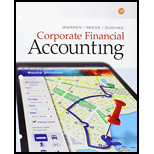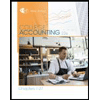
Bond discount, entries for bonds payable transactions
On July 1, Year 1, Livingston Corporation, a wholesaler of manufacturing equipment, issued $46,000,000 of 20-year, 10% bonds at a market (effective) interest rate of 11%, receiving cash of $42,309,236. Interest on the builds is payable semiannually on December 31 and June 30. The fiscal year of the company is the calendar year.
Instructions
1.
2. Journalize the entries to record the following:
A. The first semiannual interest payment on December 31, Year 1, and the amortization of the bond discount, using the straight-line method. (Round to the nearest dollar.)
B. The interest payment on June 30, Year 2, and the amortization of the bond discount, using the straight-line method. (Round to the nearest dollar.)
3. Determine the total interest expense for Year 1.
4. Will the bond proceeds always be less than the face amount of the bonds when the contract rate is less than the market rate of interest?
5. (Appendix 1) Compute the price of $42,309,256 received for the bonds by using the present value tables in Appendix A at the end of the text. (Round to the nearest dollar.)
1.
Bonds: Bonds are long-term promissory notes that are represented by a company while borrowing money from investors to raise fund for financing the operations.
Bonds Payable: Bonds payable are referred to long-term debts of the business, issued to various lenders known as bondholders, generally in multiples of $1,000 per bond, to raise fund for financing the operations.
Discount on bonds payable: It occurs when the bonds are issued at a low price than the face value.
Straight-line amortization method: It is a method of bond amortization that spreads the amount of the bond discount equally over the interest period.
To prepare: Journal entry to record the amount of cash proceeds from the issuance of the bonds on July 1, Year 1.
Answer to Problem 11.1BPR
Prepare journal entry for cash proceeds from the issuance of the bonds on July 1, Year 1.
| Date | Account Title and Explanation | Post Ref | Debit ($) | Credit ($) | |||
| July 1, Year 1 | Cash | 42,309,236 | |||||
| Discount on Bonds Payable (1) | 3,690,764 | ||||||
| Bonds Payable | 46,000,000 | ||||||
| (To record issuance of bonds payable at discount) | |||||||
Table (1)
Explanation of Solution
- Cash is an asset and it is increased. So, debit it by $42,309,236.
- Discount on Bonds Payable is an adjunct liability account and it is decreased. So, debit it by $3,690,764.
- Bonds payable is a liability and it is increased. So, credit it by $46,000,000.
Working note:
Calculate discount on bonds payable.
2. A.
To prepare: Journal entry to record first interest payment and amortization of bond discount on December 31, Year 1.
Explanation of Solution
Prepare journal entry for first interest payment and amortization of discount on bonds.
| Date | Account Title and Explanation | Post Ref | Debit ($) | Credit ($) | |||
| Year 1 | Interest Expense (4) | 2,392,269 | |||||
| December | 31 | Discount on Bonds Payable (2) | 92,269 | ||||
| Cash (3) | 2,300,000 | ||||||
| (To record semiannual payment of interest and amortization of discount on bonds) | |||||||
Table (2)
Working notes:
Calculate discount on bonds payable semiannually.
Calculate the amount of cash interest.
Calculate the interest expense on the bond.
- Interest expense is an expense and it decreases the equity value. So, debit it by $2,392,269.
- Discount on Bonds Payable is an adjunct liability account and it is increased. So, credit it by $92,269.
- Cash is an asset and it is decreased. So, credit it by $2,300,000.
B.
To prepare: Journal entry to record second interest payment and amortization of bond discount on June 30, Year 2.
Explanation of Solution
Prepare journal entry for second interest payment and amortization of discount on bonds.
| Date | Account Title and Explanation | Post Ref | Debit ($) | Credit ($) | |||
| Year 2 | Interest Expense (7) | 2,392,269 | |||||
| June | 30 | Discount on Bonds Payable (5) | 92,269 | ||||
| Cash (6) | 2,300,000 | ||||||
| (To record semiannual payment of interest and amortization of discount on bonds) | |||||||
Table (3)
Working notes:
Calculate discount on bonds payable semiannually.
Calculate the amount of cash interest.
Calculate the interest expense on the bond.
- Interest expense is an expense and it decreases the equity value. So, debit it by $2,392,269.
- Discount on Bonds Payable is an adjunct liability account and it is increased. So, credit it by $92,269.
- Cash is an asset and it is decreased. So, credit it by $2,300,000.
3.
The amount of total interest expense for Year 1.
Explanation of Solution
Determine the amount of total interest expense for Year 1.
Hence, the amount of total interest expense for Year 1 is $2,392,269.
4.
To explain: The situation when contract rate of bond is less than the market rate of interest.
Answer to Problem 11.1BPR
Yes, the bond proceeds will always be less than the face amount of bonds when the contract interest rate is less than the market interest rate.
Explanation of Solution
If the stated interest rate of a bond is less than the market interest rate, then the bonds is issued at discount. This is because the bond is less valuable in market and investors are ready to pay less than the maturity value of bonds.
5.
To calculate: The amount of cash proceeds (present value) from the sale of the bonds using present value tables.
Explanation of Solution
Determine the amount of cash proceeds (present value) from the sale of the bonds.
Step 1: Calculate the semiannual interest on bonds.
Step 2: Calculate the present value of interest.
| Particulars | Amount |
| Interest payment (a) | $2,300,000 |
| PV factor at semiannual market interest rate of 5.5% for 40 periods (b) | 16.04612 |
| Present value
|
$36,906,076 |
Table (4)
Note: Refer Appendix A in the text book for present value factor.
Step 3: Calculate the present value of lump sum payment of $46,000,000 (principal amount) at 5.5% for 40 periods.
| Particulars | Amount |
| Single payment (a) | $46,000,000 |
| PV factor at semiannual market interest rate of 5.5% for 40 periods (b) | 0.11746 |
| Present value
|
$5,403,160 |
Table (5)
Note: Refer Appendix A in the text book for present value factor.
Step 4: Calculate the amount of cash proceeds from the sale of the bonds.
Thus, the amount of cash proceeds from the sale of the bonds is $42,309,236.
Want to see more full solutions like this?
Chapter 11 Solutions
Bundle: Corporate Financial Accounting, Loose-leaf Version, 14th + CengageNOWv2, 1 term Printed Access Card
- Hudson's actual manufacturing overhead for the year was $140,600 and its actual total direct labor was 19,000 hours.arrow_forwardPlease explain the solution to this financial accounting problem with accurate explanations.arrow_forwardPlease provide the correct answer to this general accounting problem using accurate calculations.arrow_forward
- I need assistance with this general accounting question using appropriate principles.arrow_forwardHendrix Manufacturing's cost of goods sold includes $510,000 variable and $295,000 fixed costs. The company's selling and administrative expenses include $365,000 variable and $410,000 fixed costs. If the company's total sales revenue is $1,820,000, what is its net income?arrow_forwardIt is sold to wholesalers at 250 per unit.arrow_forward
 College Accounting, Chapters 1-27AccountingISBN:9781337794756Author:HEINTZ, James A.Publisher:Cengage Learning,
College Accounting, Chapters 1-27AccountingISBN:9781337794756Author:HEINTZ, James A.Publisher:Cengage Learning, Excel Applications for Accounting PrinciplesAccountingISBN:9781111581565Author:Gaylord N. SmithPublisher:Cengage LearningPrinciples of Accounting Volume 1AccountingISBN:9781947172685Author:OpenStaxPublisher:OpenStax College
Excel Applications for Accounting PrinciplesAccountingISBN:9781111581565Author:Gaylord N. SmithPublisher:Cengage LearningPrinciples of Accounting Volume 1AccountingISBN:9781947172685Author:OpenStaxPublisher:OpenStax College Cornerstones of Financial AccountingAccountingISBN:9781337690881Author:Jay Rich, Jeff JonesPublisher:Cengage Learning
Cornerstones of Financial AccountingAccountingISBN:9781337690881Author:Jay Rich, Jeff JonesPublisher:Cengage Learning Financial AccountingAccountingISBN:9781305088436Author:Carl Warren, Jim Reeve, Jonathan DuchacPublisher:Cengage Learning
Financial AccountingAccountingISBN:9781305088436Author:Carl Warren, Jim Reeve, Jonathan DuchacPublisher:Cengage Learning College Accounting, Chapters 1-27 (New in Account...AccountingISBN:9781305666160Author:James A. Heintz, Robert W. ParryPublisher:Cengage Learning
College Accounting, Chapters 1-27 (New in Account...AccountingISBN:9781305666160Author:James A. Heintz, Robert W. ParryPublisher:Cengage Learning





